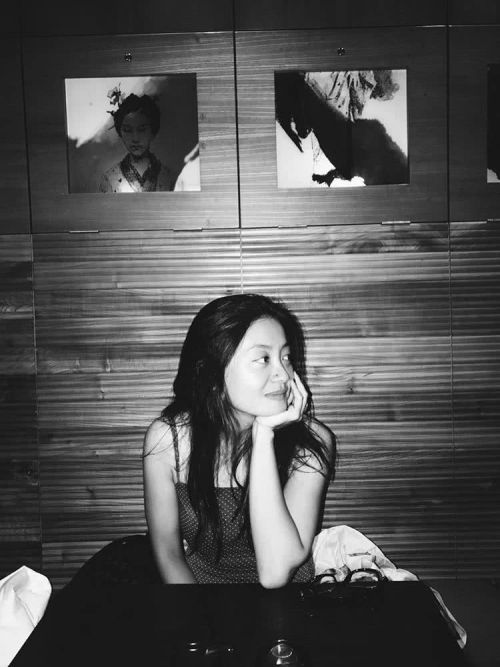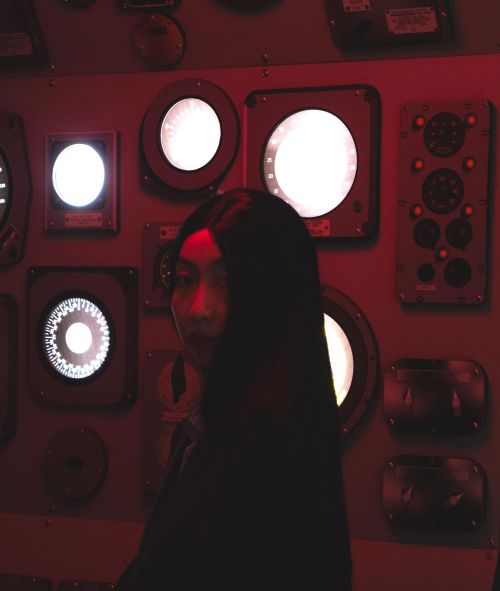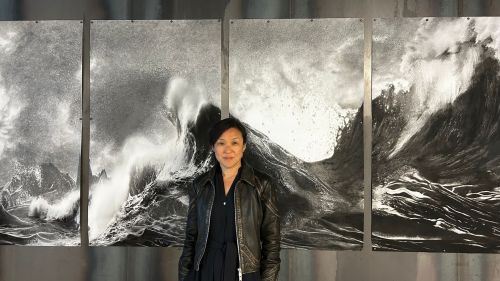Seven Up Three Down: Special Screening
Friday, July 11, 2025, 7–9pmFollowing the exhibition Seven Up Three Down at Hessel Museum, Canal Projects presents a special screening of two video works exploring memory, identity, and power through speculative and poetic lenses.
In The Curator’s Ghost, Arlette Quỳnh Anh Trần imagines a time-traveling narrative where agents are sent back to 1960s–70s Vietnam to recover a mysterious artifact linked to the nation’s origins. Along the way, they encounter Vietnam’s first curator and confront questions of history, resistance, and the curatorial role in shaping national identity.
In Silicon Islands and War, Daphné Nan Le Sergent offers a lyrical video essay tracing the global semiconductor race amid rising geopolitical tension. Focusing on Taiwan’s pivotal role in AI development, the film juxtaposes the material reality of digital production with embodied, oral, and poetic memory across Japan, South Korea, and Taiwan.
The screening will be followed by a remarks from Daphné Nan Le Sergent and conversation between Arlette Quỳnh Anh Trần and the curator Đỗ Tường Linh.
Silicon Islands and War, video, essay, 37 min, 2025
Musical composition: Vincent Guiot
With musicians NEL-K, Seung-Hwan Diego Bae, Echo, Vincent Guiot
This work benefited from a creation and research grant from the Centre National des Arts Plastiques (CNAP), support from CARMA, an art and research center in French Guiana, and from the Direction Jeunesse, Culture et Sports de Guyane. This work was also supported by the European Month of Photography, Café Crème asbl Luxembourg and the Cultures space at the University of Luxembourg, by the Arts des Images AIAC laboratory at the Université Paris 8, the French Embassy in the Republic of Korea, by Sigma Japon and by Subodh Gupta.
At a time when AI is undergoing unprecedented development, the world’s powers are seeking to appropriate key technologies. One point of tension, particularly between China and the US, is the supply of state-of-the-art semiconductors manufactured in Taiwan by TSMC.
Without semiconductors, the economic growth that governments have been calling for, and which would be made possible by the productivity gains resulting from the use of AI, cannot take place. Without semiconductors, there would be no advanced weaponry, no digital memory, not even digital photography.
This video essay invites us to consider another history of digital photography, one in which the resolution of our images rises as industry miniaturizes the semiconductors that make up the image sensors in our cameras.
As the need for AI becomes ever more pressing, Taiwan’s semiconductor production continues to intensify, drawing on the island’s water and electricity resources to the detriment of the population’s needs. For Taiwan, however, relocation of the state-of-the-art semiconductor industry is out of the question, as it is seen as a “silicon shield” against China.
In this story, a Creole storyteller challenges the gigantism of digital memory with the tools of carnal memory, oral memory and poetry. Like a journey, the video takes us through three key countries in the semiconductor industry - Japan, South Korea and Taiwan - from the clichés and images we have of them to the songs and feelings that emerge, from Korean blues to Taiwanese rap.
The Curator’s Ghost, video, color and sound, 17 minutes 50 seconds
In the years 2025 and 2075, some agents travel back in time to the 1960s and 1970s in search of a hammer that contains a wealth of national origins data. During their time travels, they encounter the first Vietnamese curator who is organizing an international exhibition about national identity. The exploration of this identity, intertwined with love across time, prompts them to rebel against the system they are supposed to serve.
Commissioned by Prospect New Orleans for Prospect.6: The Future is Present, the Harbinger is Home, 2024–25
Do Tuong Linh is a curator based between Hanoi, Vietnam and New York City, United States. She holds a BA in Art History and Theoretical Criticism from the Vietnam University of Fine Arts; an MA in Contemporary Art and Art Theory of Asia and Africa from SOAS, University of London, supported by the prestigious Alphawood Scholarship; and an MA in Curatorial Studies from Bard College.
Linh has engaged in various art exhibitions and projects in Southeast Asia, Europe and beyond since 2005. She participated in international arts programs such as Le 18 Curator In Residency 2024, Asia Cultural Council Research Fellowship 2023, Ljubljana Graphic Art Biennial 2019, Slovenia; Association of Art Museum Curators conference, New York, USA; Mekong Cultural Hub 2018 – 2019, Taiwan.
Some of her notable curated exhibitions include Ceci N’est Pas Une Guerre - This Is Not A War at Eli Klein Gallery (New York, USA), Seven Up Three Down at Hessel Museum (New York, USA), Who is Weaving the Sky Net (Singapore), Means of Production 2024 (New York City, USA), Revived Photo Hanoi 2023 (Hanoi, Vietnam), Berlin Biennial 2022 (Berlin, Germany), Citizen Earth 2020 (Hanoi, Vietnam), The Foliage 3 & 4 (VCCA, Vincom Center for Contemporary Arts, Hanoi, Vietnam) 2019, Geo-Resilience of the All-world at La Colonie (Paris, France) 2018, the No War, No Vietnam exhibition at Galerie Nord (Berlin, Germany) 2018, and SEAcurrents (London, UK) 2017.
Arlette Quỳnh Anh Trần is an art laborer based in Saigon, recognized for her individual and collective artistic practices, as well as her curatorial and writing contributions. Her artworks combine political discourse with science fiction aesthetics, employing mediums such as animation, 3D design, historical archives, and architecture. Arlette is particularly engaged with the concept of a futuristic Third World utopia in which political ideals are reimagined, allowing for the coexistence and integration of human and non-human entities. Through her work, she presents a non-linear and absurd interpretation of modern histories that critically interrogates dominant post-Cold War narratives concerning the Third World.
In 2012, she co-founded the Art Labor collective, working at the intersection of visual arts and other disciplines in various public contexts. The collective is committed to long-term, multifaceted projects like seed cultivation.
Arlette’s individual and collective works have been exhibited in notable venues, including the National Gallery Singapore, Lagos Biennial 2024, Albertinum Staatliche Kunstsammlungen in Dresden, Asia Culture Center in Gwangju, Dhaka Art Summit, the 57th Carnegie International, Cosmopolis #1 at the Centre Pompidou in Paris, and the Leeum Museum of Art in Seoul. Her video works have been selected for the International Film Festival Rotterdam and the International Short Film Festival Oberhausen.
Daphné Nan Le Sergent's work considers photography as a medium of memory dependent on the production of raw materials in today’s shifting context of globalization and its economic wars. This work also explores the photographic medium as a visual material modulated by a drawing, seeking to create images thought to be imprinted with a sensitive memory. Born in 1975 in South Korea, Daphné Le Sergent lives and works in Paris. She is associate professor at Paris 8 University.
Solo exhibitions (latest) : Tales of the generating and destructive power of the feathered snake (Xalapa Museum of Anthropology, Mexico, 2025); DAO, Artificial Memory and Collective Intelligence (La Capsule / NEMO Biennal, Paris, 2023); Defected Times (Contretype, Brussels, 2023); Silver memories, (CPIF 2021/ Casino Luxembourg, EMOP, 2021/Atelier Hermès, Seoul, South Korea, 2019); Geopolitics of Oblivion (Jeu de Paume Paris/ CAPC/ Museo Amparo, Mexico, 2018).

-

Đỗ-Tường Linh Photo by Xuan Phan. -

Arlette Quỳnh-Anh Trần Photo by Minh Red Nguyen. -

Daphané Le Sergent Photo by Lynn Taziaux.